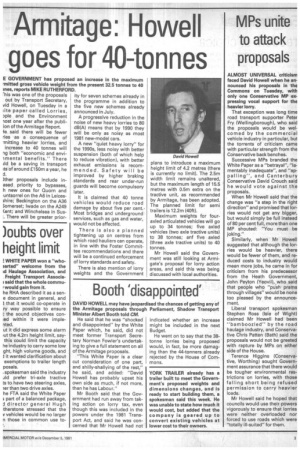MPs unite to attack proposals
Page 3

If you've noticed an error in this article please click here to report it so we can fix it.
ALMOST UNIVERSAL criticism faced David Howell when he announced his proposals in the Commons on Tuesday, with only one Conservative MP expressing vocal support for the heavier lorry.
That exception was long time road transport supporter Peter Fry (Wellingborough), who said the proposals would be welcomed by the commercial vehicle industry in particular, but the torrents of criticism came with particular strength from the Conservative back benches.
Successive MPs branded the White Paper as a "betrayal", "la
mentably inadequate", and "appalling", and Canterbury
Conservative David Crouch said he would vote against the proposals.
When Mr Howell said that the change was "a step in the right direction" and promised that lorries would not get any bigger, but would simply be full instead of 80 per cent full, more than one MP shouted: "You must be joking."
Similarly, when Mr Howell suggested that although the lorries would be heavier, there would be fewer of them, and reduced costs to industry would mean more jobs, he came in for criticism from his predecessor from the Heath Government, John Peyton (Yeovil), who said that people who "push prams through villages" would be none too pleased by the announcement.
Liberal transport spokesman Stephen Ross (Isle of Wight) claimed Mr Howell had been "bamboozled" by the road haulage industry, and Conservative Chris Patten (Bath) said the proposals would not be greeted with rapture by MPs on either side of the House.
Terence Higgins (Conservative, Worthing) sought Government assurance that there would be tougher environmental restrictions on lorries, with those falling short being refused permission to carry heavier loads.
Mr Howell said he hoped that councils would use their powers vigorously to ensure that lorries were neither overloaded nor forced to use roads which were "totally ill-suited" for them.


































































